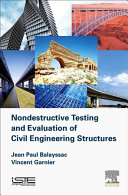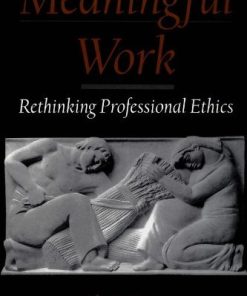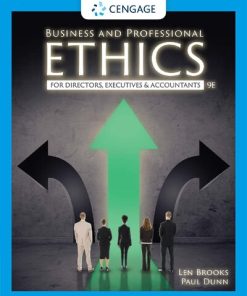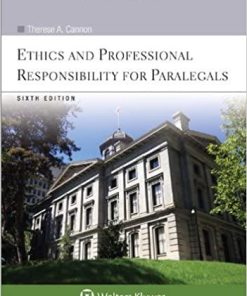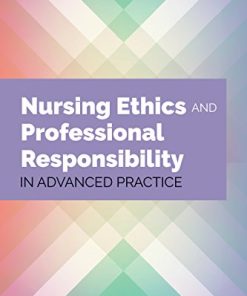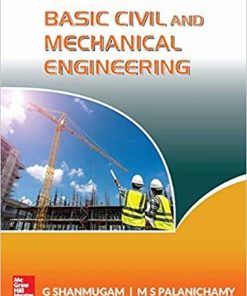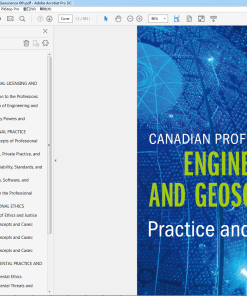Ethics in Civil and Structural Engineering Professional Responsibility and Standard of Care 1st edition by Dave Adams 1260463125 9781260463125
$50.00 Original price was: $50.00.$25.00Current price is: $25.00.
Ethics in Civil and Structural Engineering: Professional Responsibility and Standard of Care 1st edition by Dave K. Adams – Ebook PDF Instant Download/DeliveryISBN: 1260463125, 9781260463125
Full download Ethics in Civil and Structural Engineering: Professional Responsibility and Standard of Care 1st edition after payment.
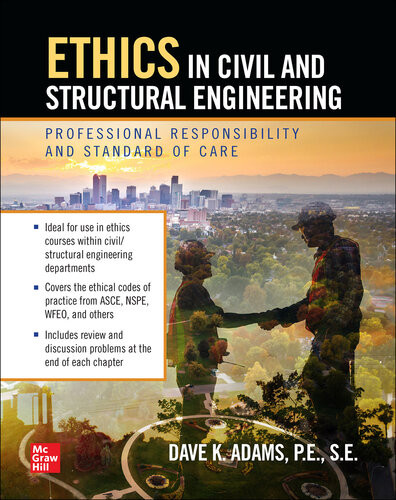
Product details:
ISBN-10 : 1260463125
ISBN-13 : 9781260463125
Author : Dave K. Adams
Learn the principles and practices of ethics as applied to civil and structural engineering This comprehensive textbook looks at ethics through the lens of civil and structural engineering. Written by a practicing engineer and experienced author, Ethics in Civil and Structural Engineering: Professional Responsibility and Standard of Care uses known standards of professional care, ethical codes of conduct, court opinions, and case studies to connect core concepts to real-world professional practices. You will get strategies for ethically approaching pivotal issues, including environmental sustainability, resilient construction, professional responsibility, business and interpersonal relationships, and dispute resolution. Coverage includes: An overview of ethics and morality Defining and understanding competence A clear outline of engineering ethics Consideration of degrees of negligence Dealing with uncertainty and assessing error Professional responsibility Legal expectation of care in practice Ethical considerations with codes and regulations Historical development of ethical thought Justification for competent and ethical choices Case studies in ethics and standard of care Ethics and sustainability The globally conscious engineer
Ethics in Civil and Structural Engineering: Professional Responsibility and Standard of Care 1st Table of contents:
1 Introduction to Ethics and Morality
1.1 Life, Liberty, and the Pursuit of Happiness
1.1.1 Differences of Opinion
1.1.2 The Universal Declaration of Human Rights
1.1.3 Basic Civility
1.2 Why Study Ethics as an Engineer?
1.3 Branches of Ethical Theory
1.3.1 Metaethics
1.3.2 Normative Ethics
1.3.3 Applied Ethics
1.4 Morality and Virtue
1.4.1 Virtue Ethics
1.5 Review Questions
1.6 Discussion Questions
2 Defining and Understanding Competence
2.1 Career Readiness
2.2 The Profession of Engineering
2.2.1 What Is Civil Engineering?
2.2.1.1 Land Surveying
2.2.1.2 Professional Geologists
2.2.2 What Is Structural Engineering?
2.2.3 Education
2.2.3.1 Engineering Program Accreditation
2.2.4 Training
2.2.5 The Role of Competency Exams
2.3 Minimally Competent
2.3.1 Body of Knowledge
2.3.1.1 Teamwork
2.3.2 What Is Moral Competence?
2.4 Negligence in Practice
2.4.1 Criminal Negligence
2.5 Uncertainty and Expectation
2.5.1 Unforeseen or Inaccurate/Incomplete Assessment of Site Conditions
2.5.2 Incomplete Coordination of Design Documents
2.5.3 Changes in Design or Owner Program Requirements
2.6 A Model for Competency
2.6.1 Foundational Competencies (Tiers 1–3)
Recommended Additional Reading
2.6.2 Industry-Wide Competencies (Tier 4)
Recommended Additional Reading
2.6.3 Suggested Tier 5 Competencies for Civil and Structural Engineering
Recommended Additional Reading
2.7 A Model for Self-Improvement
2.8 Review Questions
2.9 Discussion Questions
3 Professional Responsibility
3.1 The Public
3.1.1 Licensure
3.1.1.1 Responsible Charge
3.1.1.2 Conflicts of Interest
3.2 Employers, Clients, and Colleagues
3.3 The Profession
3.3.1 Serving as an Expert Witness
3.4 Review Questions
3.5 Discussion Questions
4 Legal Expectation of Care in Practice
4.1 What Is the Law?
4.1.1 Civil, Criminal, and Ethical Crimes
4.2 Construction Regulations
4.2.1 Planning and Construction Codes
4.2.2 Ethical Concerns with Adopted Codes
4.3 Licensing an Engineer
4.3.1 Standards of Practice and Conduct
4.4 Defining a Standard of Care
4.4.1 What About Murphy’s Law?
4.4.2 Judicial Interpretations of Care and Duty
4.4.2.1 Seiler v. Levitz Furniture Co.
4.4.2.2 City of Mounds View v. Walijarvi
4.4.2.3 Black+Vernooy Architects v. Smith
4.4.2.4 Graves v. SE Downey Registered Land Surveyor
4.5 Review Questions
4.6 Discussion Questions
5 Historical Development of Ethical Thought
5.1 Confucius (China, 551–479 BCE)
5.1.1 Keeping Promises
5.1.2 Character Traits of a Gentleman
5.1.3 The Way of Goodness
5.2 Aristotle (Greece, 384–322 BCE)
5.2.1 The Essence of Moral Virtue
5.2.2 The Nature of Happiness
5.3 Ibn Miskawayh (Iran, 932–1030 CE)
5.3.1 Cardinal Virtues
5.4 John Locke (England, 1632–1704 CE)
5.4.1 Pursuing Happiness
5.4.2 Examining Freedom
5.5 Immanuel Kant (Germany, 1724–1804 CE)
5.5.1 Moral Laws as Categorical Imperatives
5.5.2 Offices of Charity
5.6 Review Questions
5.7 Discussion Questions
6 Ethical Codes of Engineering Practice
6.1 Common Rules
6.2 National Society of Professional Engineers (www.nspe.org)
6.2.1 Overview
6.2.2 Honorable, Responsible, Ethical, and Lawful
6.3 Engineering Council of the United Kingdom (www.engc.org.uk)
6.3.1 Overview
6.3.2 Respecting Competent Practice
6.4 Engineers Australia (www.engineersaustralia.org.au)
6.4.1 Overview
6.4.2 Advocacy for the Profession
6.5 Japan Society of Civil Engineers (www.jsce-int.org)
6.5.1 Overview
6.5.2 Social Infrastructure
6.6 Review Questions
6.7 Discussion Questions
7 Justification for Competent and Ethical Choices
7.1 Defining an Ethical Foundation
7.1.1 Conventional and Reflective Morality
7.1.2 Morality and Law
7.1.3 Morality and Economics
7.1.4 Morality and Obedience to Authority
7.1.5 Morality or Mere Opinion
7.1.6 A Sample Foundation
7.2 Truth and Rationality
7.2.1 What About Truth in Variance?
7.2.2 Rational Criticism
7.2.2.1 Basic Logical Argumentation
7.2.2.2 Logical Fallacies
7.3 The Art of Persuasion
7.4 Steps in Making Ethical Decisions
7.5 Problem-Solving Strategies
7.5.1 Civil Engineering
7.5.2 Structural Engineering
7.6 Review Questions
7.7 Discussion Questions
8 Case Studies in Ethics and Standard of Care
8.1 How to Study Case Examples
Suggested General References
8.2 Skyline Plaza Apartments—Bailey’s Crossroads, Virginia (1973)
8.2.1 Design and Construction
8.2.2 Collapse and Investigation
8.2.3 Conclusions and Lessons Learned
Suggested References
8.3 Teton Dam—Newdale, Idaho (1976)
8.3.1 Design and Construction
8.3.2 Collapse and Investigation
8.3.3 Conclusions and Lessons Learned
Suggested References
8.4 Hartford Civic Center Stadium—Hartford, Connecticut (1978)
8.4.1 Design and Construction
8.4.2 Collapse and Investigation
8.4.3 Conclusions and Lessons Learned
Suggested References
8.5 Minneapolis I-35W Bridge—Minneapolis, Minnesota (2007)
8.5.1 Design and Construction
8.5.2 Collapse and Investigation
8.5.3 Conclusions and Lessons Learned
Suggested References
8.6 Eighth Street Pedestrian Bridge—Miami, Florida (2018)
8.6.1 Design and Construction
8.6.2 Collapse and Investigation
8.6.3 Conclusions and Lessons Learned
Suggested References
8.7 Review Questions
8.8 Discussion Questions
9 The Globally Conscious Engineer
9.1 A Global Reality
9.2 Rules and Responsibilities
9.2.1 Green Construction Codes and Standards
9.2.1.1 International Green Construction Code (IgCC)
9.2.1.2 National Green Building Standard (ICC 700)
9.2.1.3 Federal Laws
9.2.1.4 Miscellaneous Rules and Regulations
9.2.2 Professional Responsibility and Discretion
9.2.3 A Rational Position
9.3 Social Sustainability
9.4 Sustainable and Resilient Development
9.4.1 The UN Sustainable Development Goals
9.4.1.1 Basic Human Needs (Goals 1–4 and 6)
9.4.1.2 Basic Human Rights (Goals 5, 10, 16, and 17)
9.4.1.3 The Environment (Goals 13–15)
9.4.1.4 Benefit of Future Human Livelihood (Goals 7–9, 11, and 12)
9.4.2 Promotion and Support
9.5 Civil Engineering Solutions
9.5.1 Green Highway and Hardscape Construction Materials
9.5.2 Sustainable and Resilient Urban Drainage Systems
9.5.3 Optimization and Resilience of Transportation Systems
9.5.4 Principles of Climate Change Adaptation
9.5.5 Engineering with Nature
Additional Resources
9.6 Structural Engineering Solutions
9.6.1 Construction Materials
9.6.1.1 Concrete and Masonry
9.6.1.2 Timber
9.6.1.3 Steel
9.6.2 Resilient and Reliable Building and Bridge Design
9.6.3 Principles of Climate Change Adaptation
Additional Resources
9.7 A Global and Cooperative Responsibility
9.8 Review Questions
9.9 Discussion Questions
People also search for Ethics in Civil and Structural Engineering: Professional Responsibility and Standard of Care 1st:
what is ethics in civil engineering
why is ethics important in civil engineering
what is structural and civil engineering
civil and structural engineering companies
ethical issues in civil engineering
Tags: Ethics in Civil, Structural Engineering, Professional Responsibility, Standard of Care, Dave Adams
You may also like…
Engineering - Civil & Structural Engineering
Uncategorized
Business & Economics - Responsibility and Business Ethics
Business and Professional Ethics 9th Edition Leonard J. Brooks
Uncategorized
Nursing Ethics and Professional Responsibility in Advanced Practice 3rd Edition, (Ebook PDF)
Engineering - Mechanical Engineering & Dynamics
Basic Civil and Mechanical Engineering 1st Edition G. Shanmugam





